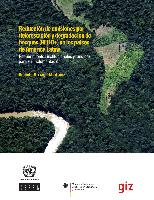Location
As a service provider in the field of international cooperation for sustainable development and international education work, we are dedicated to shaping a future worth living around the world. We have over 50 years of experience in a wide variety of areas, including economic development and employment promotion, energy and the environment, and peace and security. The diverse expertise of our federal enterprise is in demand around the globe – from the German Government, European Union institutions, the United Nations, the private sector, and governments of other countries. We work with businesses, civil society actors and research institutions, fostering successful interaction between development policy and other policy fields and areas of activity. Our main commissioning party is the German Federal Ministry for Economic Cooperation and Development (BMZ). The commissioning parties and cooperation partners all place their trust in GIZ, and we work with them to generate ideas for political, social and economic change, to develop these into concrete plans and to implement them. Since we are a public-benefit federal enterprise, German and European values are central to our work. Together with our partners in national governments worldwide and cooperation partners from the worlds of business, research and civil society, we work flexibly to deliver effective solutions that offer people better prospects and sustainably improve their living conditions.
Members:
Resources
Displaying 241 - 245 of 340Land tenure security in selected countries: Synthesis report
In this synthesis report, the issue of tenure security is addressed and assessed in several countries where government, civil society, the private sector and development cooperation initiatives have been implemented for decades. The selected case studies from fifteen (15) countries ensure not only a geographic balance but they also represent countries with different socio-economic and land-related histories and that have followed different pathways. The studies’ key findings underline the still precarious state of tenure security in many countries.
Land use planning. Concept, tools and applications
Land is a scarce resource increasingly affected by the competition of mutually exclusive uses. Fertile land in rural areas becomes scarcer due to population growth, pollution, erosion and desertification, effects of
climate change, urbanization etc. On the remaining land, local, national and international users with different socioeconomic status and power compete to achieve food security, economic growth, energy supply, nature
The legal framework of state land leases and concessions in the Lao PDR
Discussion paper on the legal framework of state land leases and concessions in Lao PDR. This paper summarizes the relevant laws and regulations and indicate contradictions in the legislation wherever contradictions exist. Research was supported by the GIZ – Land Management and Registration Project (LMRP) contribution to the Northern Uplands Development Program as product of the land management component.
Reducción de emisiones por deforestación y degradación de bosques (REDD+) en los países de América Latina: requirimientos institucionales y jurídicos para su implementación
El objetivo de este estudio es contribuir al análisis de los elementos institucionales y legales de los países de América Latina que favorecen o limitan la implementación de un mecanismo REDD+ (Reducción de Emisiones por Deforestación y Degradación) en ellos.
Land Use Planning
Land is a scarce resource increasingly affected by the competition of mutually exclusive uses. Fertile land in rural areas becomes scarcer due to population growth, pollution, erosion and desertification, effects of climate change, urbanization etc. On the remaining land, local, national and international users with different socioeconomic status and power compete to achieve food security, economic growth, energy supply, nature conservation and other objectives. Land use planning can help to find a balance among these competing and sometimes contradictory uses.




